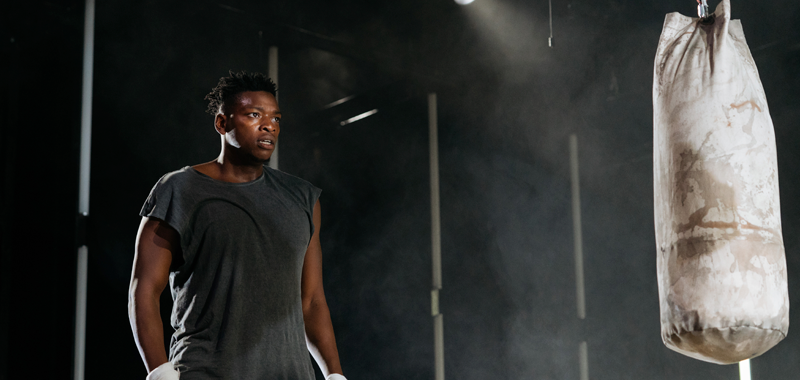Traditional interpretations of Othello have focussed on the role that race has played in the shaping of the central character. The 'Moor of Venice' struggles in vain to contain his jealousy, egged on by Iago his deceitful lieutenant into murdering his innocent wife Desdemona. From the outset it is clear that this production by the English Touring Theatre (in conjunction with Bristol Tobacco Factory and the Oxford Playhouse) has decided to make religion, rather than race, the defining characteristic of Othello. The result is a fresh perspective on the text and wholly accessible production with a relevant message to a modern audience.
The opening adds in a scene of the marriage of Othello (Victor Oshin) Desdemona (Kitty Archer) in a traditional Muslim ceremony. He binds a handkerchief around the wrist of his young bride as a love token, foreshadowing the significant part this item will play in the story and acknowledging that Othello has secretly retained his Islamic faith in a Christian world. Director Richard Twyman further explores these layers throughout the evening, notably when Othello smashes his Misbaha (prayer beads) when swearing to murder his wife, and then commits suicide using a dagger disguised as a crucifix. Religious iconography abounds with costume and slight textual changes emphasising these ideas in an innovative fashion.
Another significant departure from tradition, sees Othello played as a much younger man, his age much closer to Desdemona so they are more a pair of excited innocent lovers at the outset. In turn, Iago (Paul McEwan) is portrayed as an older 49 years, his quote 'I have looked upon the world for SEVEN times seven years' making him more experienced and world weary than the ambitious 28 year old in the original text. This change also informs his motivation for wanting to see Othello damned, his belief that Othello has slept with his wife Emilia (Kelly Price) drives him on, rather than the fact he has been overlooked for promotion in favour of Cassio (Philip Correia). Again, these changes have a revitalising effect on the audience perception and understanding of the characters and their relationships with each other.
The chief beneficiaries of this shift in emphasis are undoubtedly Iago and Emilia. Iago is played by McEwan as cunning but not intractably evil. He sits on the lip of the stage and discusses with the audience how he will bring about murder; he is polite and calm, the epitome of a sociopath and all the more chilling because of it. It is a subtly manipulative performance by McEwan, designed to fool both the other characters and audience alike into misunderstanding Iago's character. Kelly Price was equally outstanding as Emilia, giving this ostensibly secondary female character both melancholy and gravitas tinged with an earthy humour. Price is a hugely experienced musical theatre performer and the revamped 'Willow' song with Desdemona was given as a sexual romp rather than a sad lament; a brilliant reinvention.
Victor Oshin is making his stage debut in this production and gives a young vibrancy to the character of the Moor. Any critique would centre around the loss of poetry that his delivery of the lines engendered, soulful and soft being often lost at the expense of brash, but he portrayed the physical strength and attractive persona that would persuade Desdemona (and many of the sixth form audience present) to submit to his will. In a similar vein, Kitty Archer is another actress very early in her stage career seeming to often push through Desdemona's lines at speed, sometimes not fully realising their meaning to the audience. This improved markedly in the second half, and the final death scene was beautifully realised with the massive frame of Oshin towering over both Desdemona and the audience at the very front of the stage.
The design decisions by Georgia Lowe incorporated into this production aided immensely in the clarity of the story telling. Use of modern music and costume brought life and relevance to scenes involving the ensemble, particularly the Cassio drinking scene' which was hilariously executed. Lowe used a bare stage surrounded with vertical strip lighting allowing both stark illumination and shadowy intrigue to be physically realised as the text required.
This is an Othello we are not familiar with; being used to examine the prejudices and preconceptions that the Christian holds against the Muslim world, rather than the more familiar dichotomy around race and colour. However, just as some of the most memorable productions in the last century illustrated the civil rights and apartheid struggles in the United States and South Africa, this interpretation is a timely one for a 2018 audience. It mirrors a modern world where the lack of mutual understanding between Christianity and Islam has never been greater.
Reviewer: Paul Wilcox
Reviewed: 23rd October 2018
North West End Rating: ★★★★

